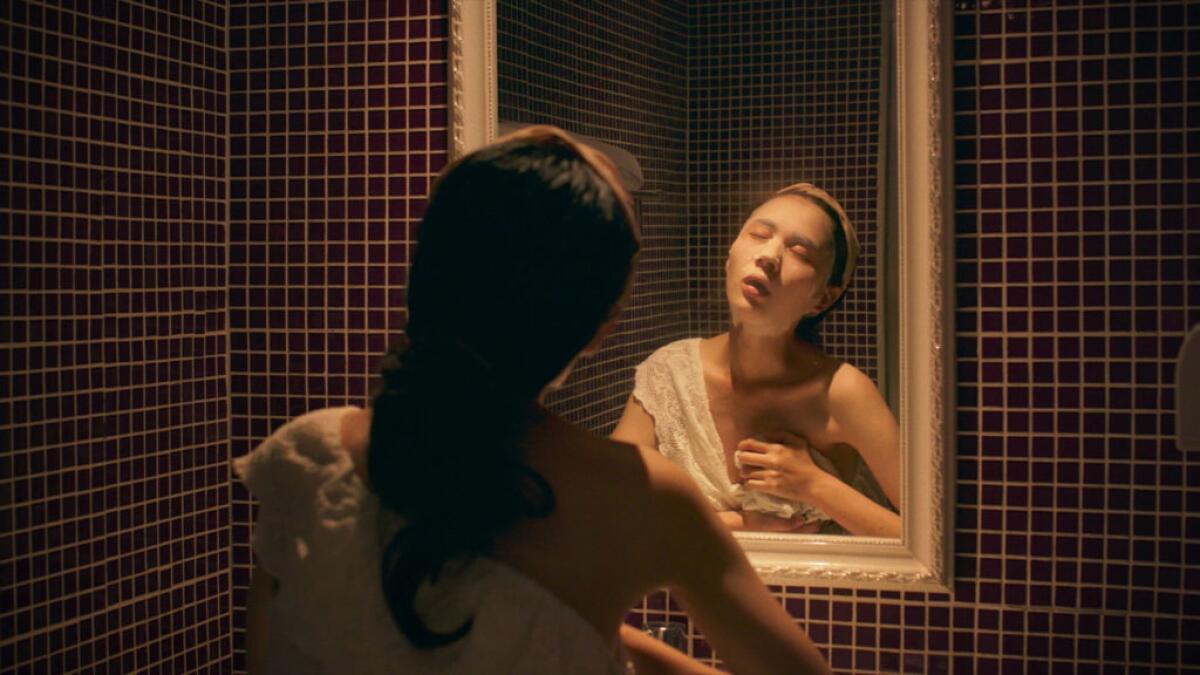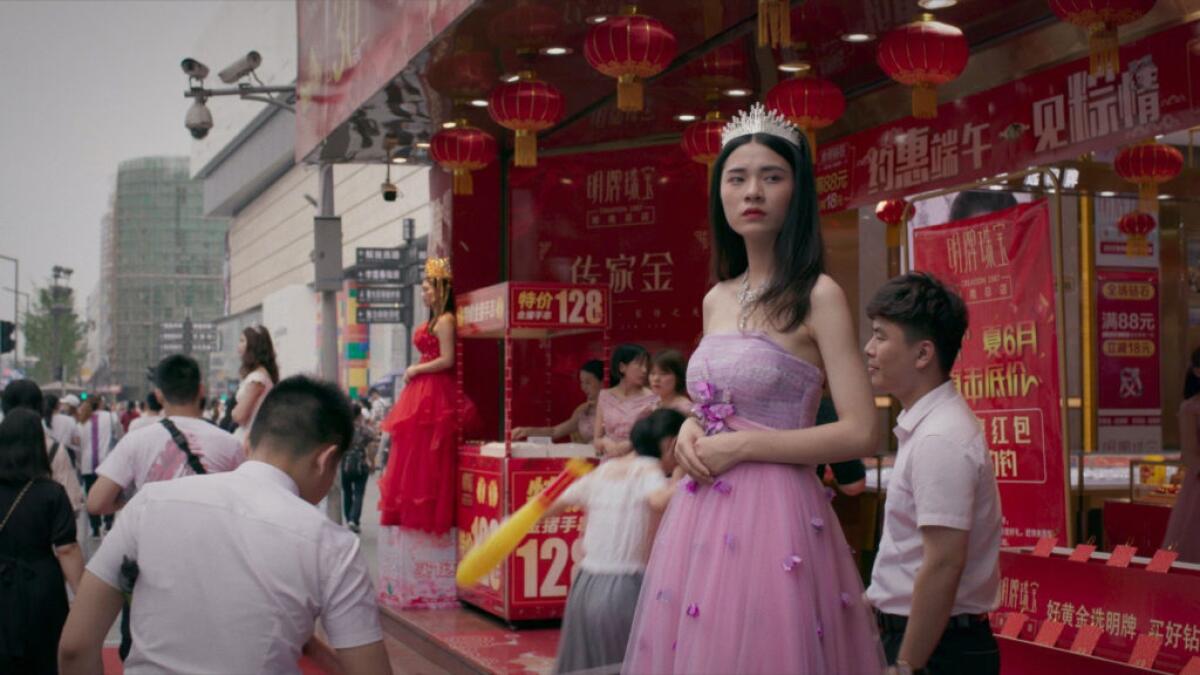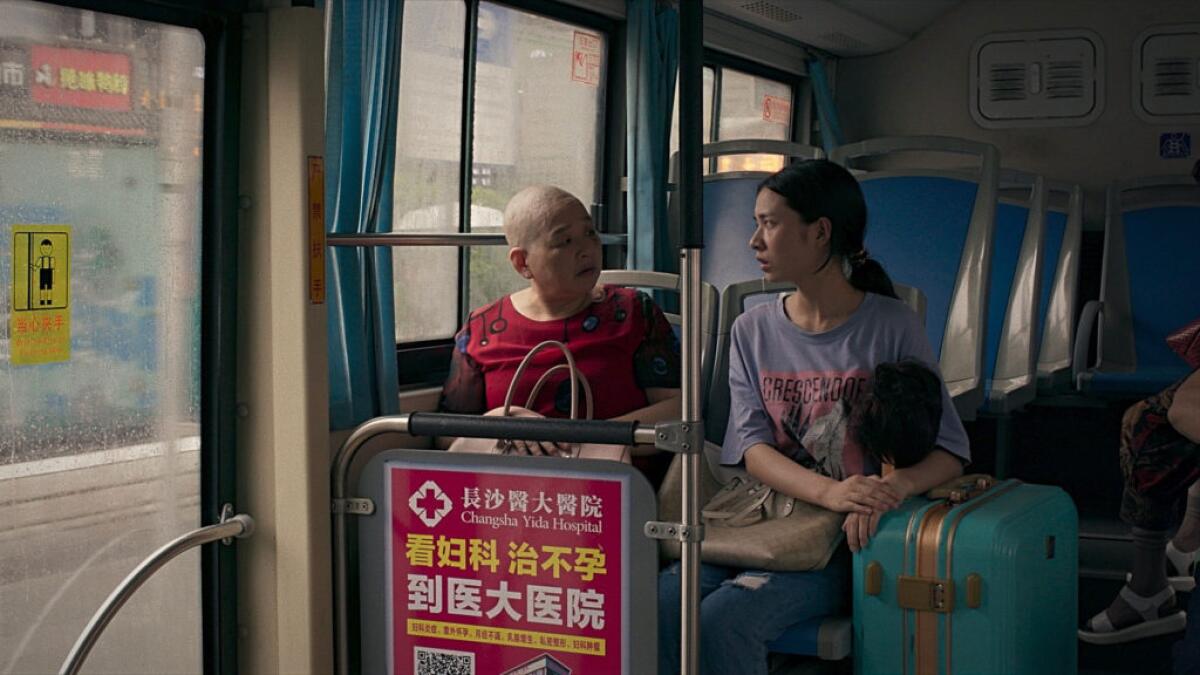The quietly devastating ‘Stonewalling’ weighs the cost of a woman’s sacrifice

- Share via
“Stonewalling” begins with a celebration, an idyllic outdoor gathering of young Chinese men and women who’ve been taking English classes in preparation for exciting travels and new opportunities abroad. The year is 2019, and the mood is optimistic, the food and wine abundant. Their teacher stands and, in fluent if slightly faltering English, offers them some airy words of encouragement: “Don’t over-engineer your life. … Sometimes life’s about ‘go with the flow.’ Don’t overthink it. Live at the moment.” By the end of this toughly observed, brutally honest movie, that speech — and this entire dumb evening, with its patio string lights, matcha cakes and banal chitchat — will seem like purest fantasy.
Seated at the table, and so quiet and unobtrusive that it takes a moment to register her as the movie’s principal character, is a pretty 20-year-old college student named Lynn (Yao Honggui). She’s there with her boyfriend, Zhang (Liu Long), a polished go-getter with big dreams: They’ll learn English, and Lynn will work as a flight attendant until they’ve saved enough to move to the U.K. In the meantime, they’re living at a hotel in the city of Changsha and getting by through odd modeling gigs. Yet as her boyfriend condescendingly natters on and on and posts his pics on TikTok, Lynn looks vaguely ill at ease, not entirely with the program, and not just because of the persistent pain in her breast.
The source of that pain is revealed in due course: Lynn is pregnant. In one of the plot’s sharpest formulations, she finds this out only after being screened for a sketchy egg donor program, during which she observes firsthand — though likely not for the first time — how easily and systematically women’s bodies are subjugated to the whims of a demanding marketplace. And so it is with Lynn: Pregnancy may disqualify her for the donor program and disrupt her plans, but it also presents her with something of an opportunity. Rather than procure an abortion, as Zhang wants her to, she could give birth and, through an adoption arrangement whose parameters are continually being renegotiated throughout, settle her mother’s outstanding debts.

Running a generous but unwasted, entirely absorbing 147 minutes, “Stonewalling” is the third collaboration between the husband-and-wife filmmakers Huang Ji and Ryuji Otsuka, who live in Japan but who make downbeat portraits of privation and hardship in contemporary China. (Huang is Chinese; Otsuka is Japanese.) Their latest work completes a kind of thematic trilogy with their earlier “Egg and Stone” (2012) and “The Foolish Bird” (2017), in which the gifted Yao also played isolated young women in difficult, increasingly desperate circumstances. Movie by movie, she and the filmmakers pull back the veil on a world whose cruel logic is dictated by economic necessity and where women bear the brunt of that cost at every turn.
So Lynn takes a break from college and her boyfriend and moves back in with her parents, who have a cramped apartment and run an adjoining pharmacy-clinic. (Her parents are played by Huang’s real-life parents, Huang Xiaoxiong and Xiao Zilong; the home we see on-screen is theirs.) The shift from Changsha’s gleaming high-rises and luxurious shops and offices to Lynn’s smaller suburban hometown provides a visual jolt, though crucially, wherever she is, Lynn seems to take up barely any space. Nearly every scene is composed as a single-take master shot, observing the characters and their interactions at something of a remove, and showing us how physically and spiritually dwarfed they are by their environs. (Otsuka shot the movie himself; the fluid, restrained cutting is by Liao Ching-sung, known for his work with the Taiwanese master Hou Hsiao-hsien.)
And so you’ll spy people wandering in and out of the frame behind Lynn when she goes for a walk or retreats to an open courtyard to make a phone call. At other times you might scan the faces in a crowded room where Lynn’s mother learns to hawk skin-care products in hopes of making a few extra yuan. (Someone is always selling or learning to sell something in “Stonewalling,” whether it’s Lynn waxing breathlessly poetic about the merits of children’s toothpaste or her mom renegotiating the terms of the baby’s adoption.)

When the movie goes in for an infrequent closeup — a shot of ultrasound gel being smeared on Lynn’s belly or of Lynn’s face as she puts on a surgical mask in the immediate wake of the COVID-19 outbreak — the intimacy is startling, and instructive. For the camera to lavish attention on a single soul suddenly feels like an indulgence, a rare privileging of the individual over the collective. The same formal restraint characterizes the filmmakers’ use of music (composed by Ng Chor Guan), which fades up at only the briefest instances and has the effect of enfolding the characters in a gentle but fleeting embrace.
These isolated moments pass quickly and are all the more devastating for it. “Stonewalling” doesn’t sentimentalize or squeeze tears for Lynn, who, for all her meekness, naivete and often-foolish decisions, is tough enough to have long ago waived her right to self-pity. She works hard through her pregnancy, taking on dubious and demeaning jobs, exhausting herself to an unhealthy degree and trying, at one point, to break up a violent fight between her unhappily married parents. She absorbs every tragic indignity with the utmost calm, whether it’s a woman’s coldly appraising glance or a man’s tidy valuation of the life growing inside her.
Acceptance, however, doesn’t mean ignorance. Toward the end of “Stonewalling,” Lynn meets with Zhang and gives him money, paying him back the small sum that he had earlier complained about spending on her now-canceled English classes. He refuses the money, ashamed (finally) of his behavior, but she keeps holding it out to him with a persistence that feels like a rebuke. It’s the quietly defiant gesture of someone inured to the transactional nature of her relationships and who’s also figured out, at long last, precisely what she’s worth.
‘Stonewalling’
In Mandarin with English subtitles
Not rated
Running time: 2 hours, 27 minutes
Playing: Laemmle Glendale
More to Read
Only good movies
Get the Indie Focus newsletter, Mark Olsen's weekly guide to the world of cinema.
You may occasionally receive promotional content from the Los Angeles Times.











